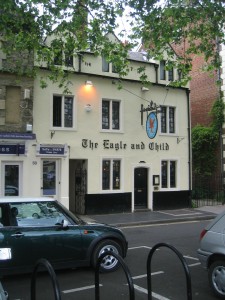Hannah Eagleson concludes her Summer Quotation Series.

In this last post of the series, we return to the twentieth century with a quotation from C. S. Lewis that brings together many of the themes touched on by the other quotations.
. . . it is not so much of our time and so much of our attention that God demands; it is not even all our time and all our attention; it is ourselves. For each of us the Baptist’s words are true: “He must increase and I decrease.” He will be infinitely merciful to our repeated failures; I know no promise that He will accept a deliberate compromise. For He has, in the last resort, nothing to give us but Himself; and He can give that only insofar as our self-affirming will retires and makes room for Him in our souls. Let us make up our minds to it; there will be nothing “of our own” left over to live on, no “ordinary” life. I do not mean that each of us will necessarily be called to be a martyr or even an ascetic. That’s as may be. For some (nobody knows which) the Christian life will include much leisure, many occupations we naturally like. But these will be received from God’s hands. In a perfect Christian they would be as much part of his “religion,” his “service,” as his hardest duties, and his feasts would be as Christian as his fasts. What cannot be admitted – what must exist only as an undefeated but daily resisted enemy – is the idea of something that is “our own,” some area in which we are to be “out of school,” on which God has no claim.
– “A Slip of the Tongue,” in The Weight of Glory by C. S. Lewis (emphasis added)
I’ve talked in this series about the importance of offering the specifics of the academic life to God and of inviting Him into it. This quotation offers the broad view and reminds me that God is asking for the whole of our lives, and for every part that fits into that whole.
I love the way Lewis insists that all of life must be sacrificed to God, but also that giving God everything may well include doing many things we enjoy. I first read this quotation as a teenager beginning to sort through the relationship between faith and academic study. I was afraid that perhaps I should give up studying and do something completely different; I enjoyed study, so it seemed selfish. It was really helpful to realize that God’s calling to me might well embrace many things that I enjoyed, including the pursuit of study. It was also helpful to realize that the things I enjoyed could be offered to God as well as the difficult things I had to do. I still find the quotation helpful in trying to give all my work to God, the parts I enjoy and the parts I don’t.
What are you enjoying about your academic vocation this summer? How can you see God’s presence in those things? In what areas of your academic life are you tempted to see things as “your own” and not God’s? What helps you to invite Him into those things?
Dr. Hannah Eagleson loves building the ecosystem Christian scholars need to flourish and create positive impacts, in the university and beyond. She is Associate Director of InterVarsity’s Emerging Scholars Network, a digital first ministry serving thousands of early career Christian scholars. Dr. Eagleson launched the ESN student/early career track at the American Scientific Affiliation annual faith and science conference. She is the editor of *Science and Faith: Student Questions Explored* (Hendrickson, 2019), and the one-semester guidebook *Scholar’s Compass: Connecting Faith & Work for Academics* (InterVarsity Emerging Scholars Network, 2021), with design by noted liturgical artist Ned Bustard. She also launched the Scholar’s Compass online devotional series in her previous role as ESN Editor. Dr. Eagleson holds an MA from St. John’s College (Annapolis, MD) and a PhD in Renaissance literature from the University of Delaware.

Leave a Reply